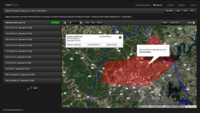-
ShotSpotter helps Washington, D.C. police track gunshots
Law enforcement officers in Washington, D.C are better equipped to track and monitor gunshots in the city’s most violent neighborhoods by using ShotSpotter, a system of rooftop sensors which recognizes sounds from gunfire. Law enforcement officials can track shooting incidents and also predict locations and time of future shooting incidents by analyzing records provided by ShotSpotter.
-
-
UAV developer CyPhy Works raises $7 million to build flying robots
Danvers, Massachusetts-based CyPhy Works, a developer of advanced UAVs, the other day announced the close of a $7 million financing round led by Lux Capital, with participation from General Catalyst Partners, Felicis Ventures, and several undisclosed angel investors. As part of the financing, Lux Capital Partner Bilal Zuberi will join the CyPhy Works board of directors. The company says it targets 24/7 “persistent” operations.
-
-
Many Android vulnerabilities result from manufacturer modifications
Computer security researchers have found that Android smartphone manufacturers are inadvertently incorporating new vulnerabilities into their products when they customize the phones before sale, according to a recent study. On average, the researchers found that 60 percent of the vulnerabilities found in the smartphone models they evaluated were due to such “vendor customizations.”
-
-
China buys Implant Sciences explosives detectors to protect nuclear power plants
Implant Sciences has sold multiple units of its QS-H150 handheld explosives trace detectors to a customer in China, who will be deploy them across several locations for the purpose of protecting nuclear power plants in multi-layered security environments.
-
-
Pyreos, ultra‐low power consumption IR sensor specialist, secures $4 million investment
Edinburgh, Scotland-based Pyreos Limited, a specialist in ultra‐low power consumption infrared sensor technology, the other day announced plans for international expansion after securing a further funding round of $4 million. It is possible to use Pyreos sensor arrays in many applications, among them border security, where they can identify human movement at distances of several kilometers.
-
-
U.S. policy should encourage foreign Ph.D. students to stay: study

Attracting more talented foreign students to study at U.S. universities and encouraging them to launch entrepreneurial ventures here could help “revitalize innovation and economic growth” in this country, three economists conclude in a new study. The researchers have found that high-performing foreign-born Ph.D. students improve the “creation of knowledge” in U.S. universities. When knowledge is created, it tends to drive entrepreneurial investment and economic growth.
-
-
DHS, FDA: Decorative contact lenses for Halloween costumes are risky
Many will celebrate Halloween today, and federal officials are warning the public about the dangers associated with counterfeit decorative contact lenses. Decorative and colored lenses are becoming increasingly popular, especially around this time of year. Several federal agencies have teamed up to launch Operation Double Vision – already underway — to seize illegal, harmful products from store shelves.
-
-
Trustev closes $3 million seed funding round
According to research by eMarketer, global e-commerce sales are expected to reach nearly $1.3 trillion in 2013, making online fraud prevention an urgent and important requirement for every merchant. Trustev addresses this requirement by using multiple dynamic data sources to independently verify a user’s identity on e-commerce sites. The company has just closed a $3 million seed funding round to finance the further development of its e-commerce security and online fraud protection technology.
-
-
U.S. tech companies increase lobbying efforts related to surveillance, NSA
Technology firms Apple, Google, Facebook, and Microsoft, among other tech powerhouses, are quietly increasing lobbying efforts directed at government surveillance laws as they seek to have a say in what Congress does regarding surveillance reforms and National Security Agency (NSA) programs. Traditionally, tech firms have not pushed for restrictions on the ability of the U.S. intelligence community to collect data, and it is not clear what position these industry leaders will take, whether they plan to take a position at all, or whether they will present lawmakers with a united industry front.
-
-
Start-ups offer law enforcement innovation, flexibility, and low prices
Start-ups offer innovation and flexibility in addition to lower price points. The influx of start-ups into the law enforcement and security supply market is in its early stage, and while few start-ups have begun to compete with traditional, and much larger, players, law enforcement units appear to be attracted to the innovation and lower prices offered.
-
-
Russia to build floating nuclear power plants

Global warming is opening the Arctic Ocean to shipping – and causing the rapid melting of Arctic ice. Russia says that ship-based nuclear power plants would allow it to provide power to remote cities in Siberia, and provide power to oil and gas drilling operations in the Arctic (about 30 percent of the world’s unclaimed natural gas is in the Arctic, and about, 60 percent of that unclaimed natural gas is in the Russian Arctic). Experts worry about the ability of ship-based nuclear reactor to withstand extreme weather events, or terrorist attacks. The U.S. Army deployed its own floating nuclear reactor – the Sturgis – in the Panama Canal Zone from 1968 to 1976.
-
-
Cyphort, a threat monitoring specialist, raises $15.5 million Series B funding
San Jose, California-based Cyphort, Inc., a company specializing in advanced threat monitoring and mitigation platform, has closed in $15.5 million Series B funding. The round was led by Menlo Park, California-based Trinity Ventures with participation from existing investors Foundation Capital and Matrix Capital. Cyphort’s platform blends multi-phase behavioral analysis, machine learning, and correlation to provide businesses with real-time detection, context, and mitigation for advanced malware attacks that bypass traditional security and first generation APT solutions.
-
-
Arkansas deploys first statewide SmartPrepare system

Arkansas uses citizen-supplied data for more efficient emergency planning and response. The service allows citizens to create secure profiles online which contain vital details about their household. Public safety officials can use the data to gain greater insight into their communities and identify potential challenges in order to prepare more effectively for disasters, allocate resources, and expedite emergency response and recovery efforts during events.
-
-
DDoS protection specialist Black Lotus raises $3.5 million
San Francisco-based Black Lotus, a DDoS protection specialist, last week announced the completion of its first institutional financing in the amount of $3.5 million. The round was led by San Francisco-based Industry Capital. The strategic investment will fund entry into new markets, where Black Lotus will deploy additional capacity and improve quality of service through peering and closer proximity to global partner networks.
-
-
Sharp increase in radioactive water leaks at Fukushima
Tokyo Electric Power(TEPCO) has reported a rise in groundwater radiation levels, saying a tank at the firm’s Fukushima plant leaked 300 metric tons of toxic water in August 2013. Water samples from wells, taken in mid-October, show a record-high concentration of beta-ray emitting substances, and a sharp increase in the presence of radioactive tritium. Japanese prime ministerShinzo Abe, in a tacit admission that Japan cannot effectively handle the continuing radiation leaks from the stricken plant, said Japan would be interested in receiving foreign help to contain widening radioactive water leaks at Fukushima.
-
- All
- Regional
- Water
- Biometrics
- Borders/Immig
- Business
- Cybersecurity
- Detection
- Disasters
- Government
- Infrastructure
- International
- Public health
- Public Safety
- Communication interoperabillity
- Emergency services
- Emergency medical services
- Fire
- First response
- IEDs
- Law Enforcement
- Law Enforcement Technology
- Military technology
- Nonlethal weapons
- Nuclear weapons
- Personal protection equipment
- Police
- Notification /alert systems
- Situational awareness
- Weapons systems
- Sci-Tech
- Sector Reports
- Surveillance
- Transportation
Advertising & Marketing: advertise@newswirepubs.com
Editorial: editor@newswirepubs.com
General: info@newswirepubs.com
2010-2011 © News Wire Publications, LLC News Wire Publications, LLC
220 Old Country Road | Suite 200 | Mineola | New York | 11501
Permissions and Policies
Editorial: editor@newswirepubs.com
General: info@newswirepubs.com
2010-2011 © News Wire Publications, LLC News Wire Publications, LLC
220 Old Country Road | Suite 200 | Mineola | New York | 11501
Permissions and Policies
